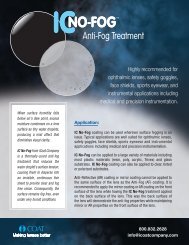Patient Information Manual - Warsaw Family Eyecare
Patient Information Manual - Warsaw Family Eyecare
Patient Information Manual - Warsaw Family Eyecare
You also want an ePaper? Increase the reach of your titles
YUMPU automatically turns print PDFs into web optimized ePapers that Google loves.
#4 Vision and Medical Insurance and Fee Policies<br />
Here is an excerpt from one of Dr. Caughell’s Newspaper articles:<br />
Yes, Medical and Vision insurance can both be used at the Eye Doctor!<br />
Medical and vision insurance is very confusing for many of our patients, and for good<br />
reason. Optometry offices are one of very few professions that use more than one type<br />
of insurance for their services. It’s important to note that the medical insurance that<br />
you use to see your family doctor can often be used to cover services at your eye<br />
doctor. Medical savings cards and flex money can also be used for eye exams, glasses,<br />
and contact lenses. Please read on for further explanation.<br />
Most people think that they will always have to pay out of pocket if they don’t have<br />
vision insurance. In many cases this is not true. Vision insurance is only for routine eye<br />
exams or yearly health checks for people who don’t have any medical eye problems or<br />
only need glasses and contact lenses. Medical insurance (often with a small copay) will<br />
cover almost all other reasons for seeing your eye doctor.<br />
For example: If you have dry eye, cataracts, headaches, diabetes, glaucoma, new<br />
flashes/floaters, a red or painful eye, or other similar problems your exam can likely be<br />
billed to your medical insurance. This might include medicare, anthem, sagamore, cigna<br />
, and other similar carriers. In these circumstances they will usually cover everything<br />
except the small fee associated with the glasses or contact lens prescription.<br />
There are many eye findings that cause an eye doctor to recommend yearly exams.<br />
Using your medical insurance for the proper reasons can help you afford these<br />
important exams. Again, don’t forget that medical insurance will not cover glasses or<br />
contact lenses but may help you pay for the eye exam. If you are curious you may<br />
always contact our staff with a question, and don’t worry, we work very hard to keep<br />
our fees reasonable for our private pay patients.<br />
Here is an example:<br />
A patient who presents for a yearly diabetic eye exam and has both VSP vision insurance<br />
and Anthem BC/BS medical insurance.<br />
- In this case the eye exam should be billed to Anthem under your medical<br />
insurance. The glasses prescription part of the exam (refraction) can then be<br />
billed to VSP and you can get glasses or contact lenses with your VSP plan.



